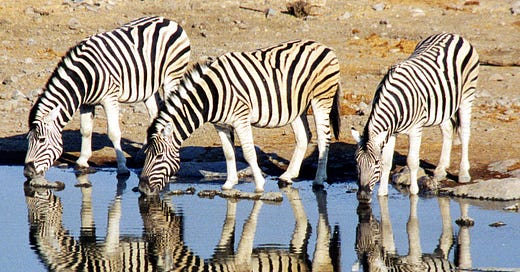Imagine you are at a party. Someone says to you: “Hello Maria, nice to see you. How are you?” The person looks familiar – but you cannot remember a name or a context through which you know this person.
Now remember your first love. These are two different memory phenomena.
The first phenomenon arises passively when something or someone triggers an experience of familiarity in you. The familiarity can be weak or strong; it can be pleasant or unpleasant – depending on what traces this person or thing has left in your life.
You actively bring about the second phenomenon. Metaphorically speaking, you are leafing through the pages of your life book and turning a past knowing into a present knowing.
The second phenomenon is aptly called ‘remembering’ because the prefix ‘re’ denotes an action of bringing something back. The first phenomenon is not a remembering in the genuine sense of the word. It can be called ‘experiencing a familiarity.’
Imagine you visit friends, and their dog greets you happily. The dog doesn’t remember you; it experiences a positive familiarity with you, perhaps because you have played with it or cuddled it in the past. The dog behaves under this familiarity.
There is a video on the internet in which a tiger “joyfully” hugs a man. Many years ago, when the tiger was a baby, this man took care of it. The tiger, therefore, experiences a positive familiarity with its former keeper and behaves accordingly.
It is said that elephants remember people who mistreated them. But this is “only” an experience of familiarity. When an elephant encounters a former tormentor, it experiences a negative familiarity and behaves accordingly.
In fact, all living beings experience familiarities, not just animals, but also plants, as has been proven in experiments.
Remembering is not observable from the outside. Therefore, you might think that we cannot know whether animals remember. But there is indirect access to the truth. We assume that an animal can remember; then we consider what consequences this would have.
Remembering consumes part of your attention. If you think about a past event while driving, ie you remember, your attention is not 100% on driving and you could miss a traffic sign.
Suppose a zebra is standing at a waterhole, thinking about what happened yesterday. While it remembers, its attention is not 100% in the present. Therefore, it doesn’t notice an approaching lion and – poof – is killed and eaten. It was easy prey. All the zebras that were not reminiscing noticed the lion and ran away. Conclusion: remembering zebras have a lower chance of survival than non-remembering zebras and would therefore die out.
Biologically, we are animals. Why didn’t we become extinct when we began remembering? Besides our minds, we have another tool that no other living being on this planet has: our hands. Their extraordinary dexterity is due to their large thumb, which can be placed opposite the fingers. This allows us to use our hand like a pair of pliers, making it a very effective gripping tool. The hands of our closest biological relatives, the great apes, do not have this feature: their thumbs are small and cannot be placed opposite the fingers.
With our hands, we built environments into which we can retreat ... eg huts. In it we can safely remember. A zebra can’t do that; nor can apes.
So the answer to the question posed in the title is: animals cannot remember; but they experience familiarity.
The belief that humans and animals are “not far apart” is a social program. I call it ‘Disneyfication’ because it arose in part because animals are portrayed human-like in popular Walt Disney productions. On the subject of ‘social programming,’ see my article “Why the Question ‘What Am I?’ is Important and Magical.”
I describe the difference between humans and animals in my article “This is the Difference Between Humans and Animals.” In my book "Consciousness – Its Nature, Purpose, and How to Use It, ” I present a ‘Theory of Mind’ that contains the complete logical derivation of the difference.
Further reading:
Article “Why the Question ‘What Am I?’ is Important and Magical”
Article “This is the Difference Between Humans and Animals”
Book "Consciousness – Its Nature, Purpose, and How to Use It”





